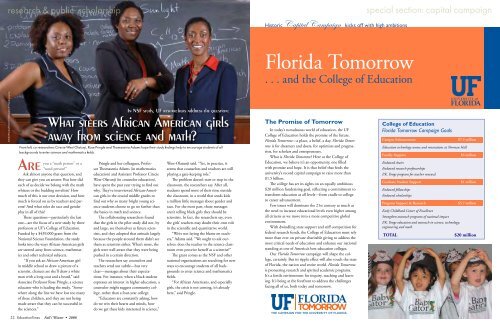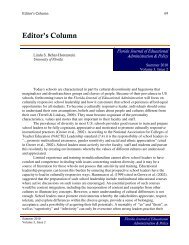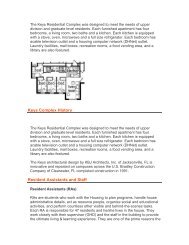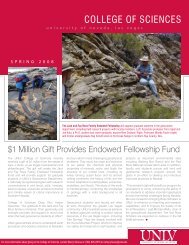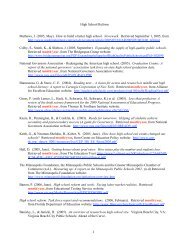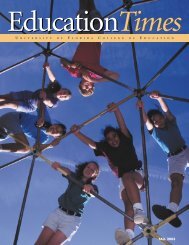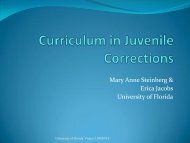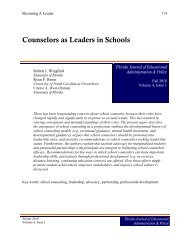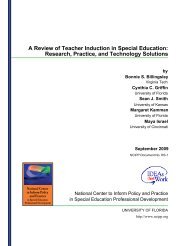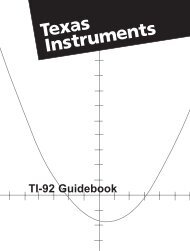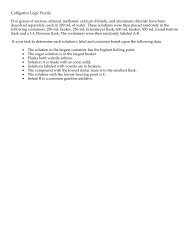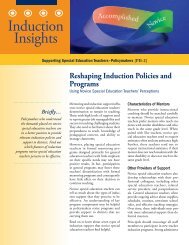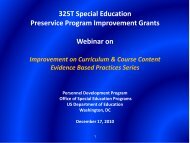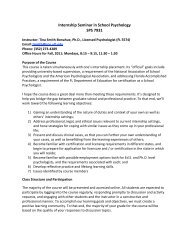Revival - College of Education - University of Florida
Revival - College of Education - University of Florida
Revival - College of Education - University of Florida
- No tags were found...
You also want an ePaper? Increase the reach of your titles
YUMPU automatically turns print PDFs into web optimized ePapers that Google loves.
esearch & public scholarshipspecial section: capital campaignHistoric Capital Campaign kicks <strong>of</strong>f with high ambitions<strong>Florida</strong> Tomorrow. . . and the <strong>College</strong> <strong>of</strong> <strong>Education</strong>KRISTEN BARTLETT GRACE/UF PhotographyIn NSF study, UF researchers address the question:What steers African American girlsaway from science and math?From left, co-researchers Cirecie West-Olatunji, Rose Pringle and Thomasenia Adams hope their study findings help to encourage students <strong>of</strong> allbackgrounds to enter science and mathematics fields.Areyou a “math person” or a“word person?”Ask almost anyone that question, andthey can give you an answer. But how dideach <strong>of</strong> us decide we belong with the mathwhizzes or the budding novelists? Howmuch <strong>of</strong> this is our own decision, and howmuch is forced on us by teachers and parents?And what roles do race and genderplay in all <strong>of</strong> this?These questions—particularly the lastone—are the focus <strong>of</strong> a new study by threepr<strong>of</strong>essors at UF’s <strong>College</strong> <strong>of</strong> <strong>Education</strong>.Funded by a $439,000 grant from theNational Science Foundation, the studylooks into the ways African-American girlsare steered away from science, mathematicsand other technical subjects.“If you ask an African-American girlin middle school to draw a picture <strong>of</strong> ascientist, chances are she’ll draw a whiteman with a long coat and a beard,” saidAssociate Pr<strong>of</strong>essor Rose Pringle, a scienceeducator who is leading the study. “Somewherealong the line we have lost too many<strong>of</strong> these children, and they are not beingmade aware that they can be successful inthe sciences.”Pringle and her colleagues, Pr<strong>of</strong>essorThomasenia Adams (in mathematicseducation) and Assistant Pr<strong>of</strong>essor CirecieWest-Olatunji (in counselor education),have spent the past year trying to find outwhy. They’ve interviewed African-Americangirls in the crucial middle grades t<strong>of</strong>ind out why so many bright young sciencestudents choose to go no farther thanthe basics in math and science.The collaborating researchers foundthat the girls in the pilot study did not, byand large, see themselves as future scientists,and they adopted that attitude largelybecause the people around them didn’t seethem as scientists either. What’s more, thegirls were well aware that they were beingpushed in a certain direction.The researchers say counselors andteachers send out subtle—but veryclear—messages about their expectations.For instance, when a black studentexpresses an interest in higher education, acounselor might suggest community college,rather than a four-year college.“Educators are constantly asking, howdo we win their hearts and minds, howdo we get these kids interested in science,”West-Olatunji said. “Yet, in practice, itseems that counselors and teachers are stillplaying a gate-keeping role.”The problem doesn’t start or stop in theclassroom, the researchers say. After all,students spend most <strong>of</strong> their time outsidethe classroom, in a world that sends kidsa million little messages about gender andrace. For the most part, those messagesaren’t telling black girls they should bescientists. In fact, the researchers say, eventhe girls’ teachers may doubt their own rolein the scientific and quantitative world.“We’re not laying the blame on teachers,”Adams said. “We ought to ask ourselves:does the teacher in the science classroomeven perceive herself as a scientist?”The grant comes as the NSF and othernational organizations are searching for newways to encourage students <strong>of</strong> all backgroundsto enter science and mathematicsfields.“For African Americans, and especiallygirls, the crisis is not coming, it’s alreadyhere,” said Pringle.The Promise <strong>of</strong> TomorrowIn today’s tumultuous world <strong>of</strong> education, the UF<strong>College</strong> <strong>of</strong> <strong>Education</strong> holds the promise <strong>of</strong> the future.<strong>Florida</strong> Tomorrow—a place, a belief, a day. <strong>Florida</strong> Tomorrowis for dreamers and doers, for optimists and pragmatists,for scholars and entrepreneurs.What is <strong>Florida</strong> Tomorrow? Here at the <strong>College</strong> <strong>of</strong><strong>Education</strong>, we believe it’s an opportunity, one filledwith promise and hope. It is that belief that feeds theuniversity’s record capital campaign to raise more than$1.5 billion.The college has set its sights on an equally ambitious$20 million fundraising goal, reflecting a commitment totransform education at all levels—from cradle to collegeto career advancement.Few issues will dominate the 21st century as much asthe need to increase educational levels even higher amongall citizens as we move into a more competitive globalenvironment.With dwindling state support and stiff competition forfederal research funds, the <strong>College</strong> <strong>of</strong> <strong>Education</strong> must relymore than ever on private charitable giving to address themost critical needs <strong>of</strong> education and enhance our nationalstanding as one <strong>of</strong> America’s best education colleges.Our <strong>Florida</strong> Tomorrow campaign will shape the college,certainly. But its ripple effect will also touch the state<strong>of</strong> <strong>Florida</strong>, the nation and entire world. <strong>Florida</strong> Tomorrowis pioneering research and spirited academic programs.It’s a fertile environment for inquiry, teaching and learning.It’s being at the forefront to address the challengesfacing all <strong>of</strong> us, both today and tomorrow.<strong>College</strong> <strong>of</strong> <strong>Education</strong><strong>Florida</strong> Tomorrow Campaign GoalsCampus Enhancement<strong>Education</strong> technology annex and renovations at Norman HallFaculty SupportEndowed chairsEndowed research pr<strong>of</strong>essorshipsP.K. Yonge program for teacher renewalGraduate Student SupportEndowed fellowshipsEndowed scholarshipsProgram Support & ResearchEarly Childhood Center <strong>of</strong> ExcellenceStrengthen outreach programs <strong>of</strong> national impactP.K. Yonge education and outreach in science, technology,engineering and mathTOTAL$7.3 million$6 million$1 million$5.7 million$20 million22 <strong>Education</strong>Times Fall / Winter • 2008


